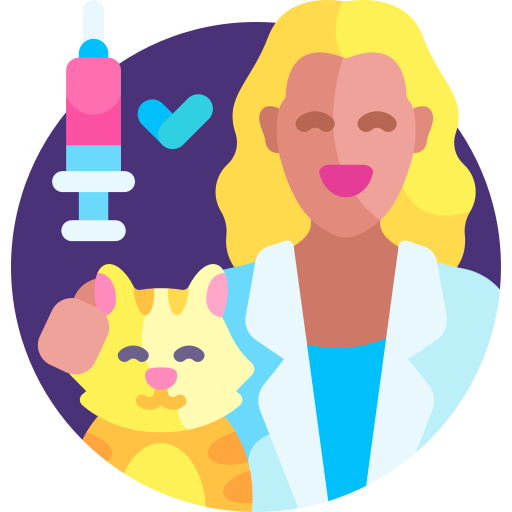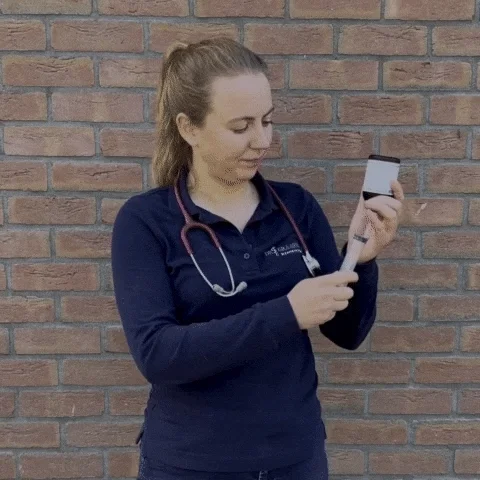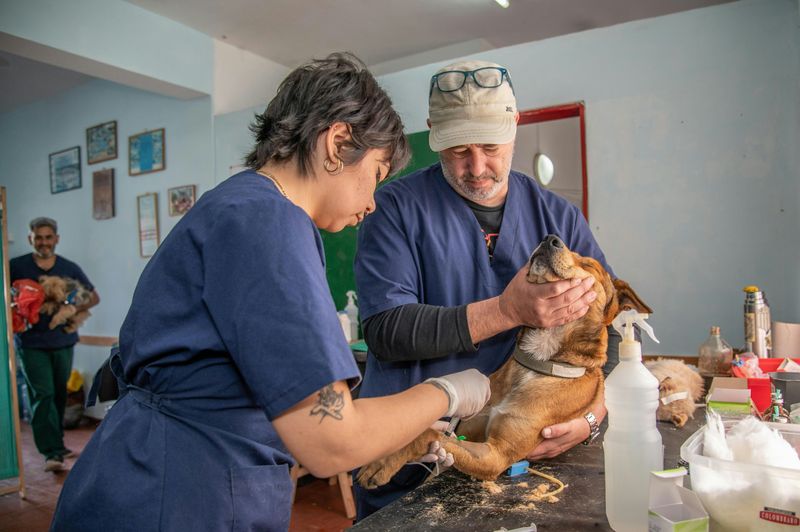
This logo isn't an ad or affiliate link. It's an organization that shares in our mission, and empowered the authors to share their insights in Byte form.
Rumie vets Bytes for compliance with our
Standards.
The organization is responsible for the completeness and reliability of the content.
Learn more
about how Rumie works with partners.
"Hey, doc, I'm feeling a little ruff..."
Most sick patients can tell you what’s wrong, but try asking a dog or a cat.
For this, the world needs a professional who is equal parts animal mind reader, problem-solving brainiac, and master of cross-species medicine: in other words,a veterinarian.
Could you be that professional?
 Image credit: Bing Copilot
Image credit: Bing Copilot
The Basics of the Job
An All-In-One Approach
You go to the (human) doctor: a cold stethoscope on the chest, a tap on the knee with the little doctor hammer. On checkout, it'd be pretty weird if they asked you to schedule a tooth cleaning, right?

In a veterinary clinic, it's a normal question and an expected service. Vets may offer more services in-house than the average human doctor, including:
Wellness exams
Surgery
Dermatology
Dental
Overnight hospitalization
A Different Kind of Care and Communication
Vets also have the following skills when interacting with patients and their owners:
Animal psychology and behavior
Owner education
Physical control and restraint
Watch the video below to see a simple but effective restraint method:
A Variety of Workplaces
 Anywhere there are animals has the potential to be a vet's workplace. In clinics, of course, they treat pet dogs, cats, birds, and hamsters, but you will also find vets:
Anywhere there are animals has the potential to be a vet's workplace. In clinics, of course, they treat pet dogs, cats, birds, and hamsters, but you will also find vets:
On farms caring for livestock.
In conservation and tourism to treat large, exotic animals like camels or elephants.
In the military or research labs to protect public health.
How Do Vets Protect Public Health?
Managing the healthcare of many different animal species makes vets the first line of defense in guarding public health.

Preventing and treating diseases that cross species (e.g, bird flu).

Inspecting food, especially food from animals.

Developing new drugs for animals and people.
Did you know?
This Byte was created by a volunteer professional that wanted to share this insight to help you succeed - no agenda, no cost.
Do You Have a Veterinarian Personality?
You love animals and are generally comfortable around them.
You're a lifelong learner who's happy to walk someone through complicated concepts.
You can learn and perfect small movements for physical exams and surgery.
You're not intimidated by larger or stronger animals.
You don't mind having patients who can't speak, and you like solving problems.
You like working with people, too! You'll be having a lot of important conversations with owners, technicians, and colleagues.
How Do I Prepare to Become a Vet?
Vet school
Your Doctor of Veterinary Medicine (DVM) diploma is at the end of this rainbow. The typical vet school:
Has a competitive application process in the US and Canada.
Is expensive and often requires large student loans.
Is four years long.
Requires passing a licensing exam (but not a residency).
Is composed of challenging science, lab, and practicum courses.
Check this list of US and Canadian vet schools to get your plan started. A word of warning: the competitive application process means many pre-vet students may look to international programs for entry.
 Image credit: Bing Copilot
Image credit: Bing Copilot
Scenario: Jenny Wants to Become a Veterinarian

Jenny has loved working directly with animals her whole life. Growing up on a farm, she’s got an instinctive understanding of how to approach a nervous horse, how to stop the chickens from eating their own eggs, and a lot more that her brothers don’t even know.
She doesn't mind her brothers or other people, but sometimes finds it hard to explain things to them. She'll start her pre-vet track after high school. Select any of the advice below that you might tell Jenny:
A. Focus on academics in college and lean on your farm upbringing when applying to a vet school.
B. Work on future client communication skills by practicing teaching your brothers what you know around the farm.
C. Focus on being a public health vet.
D. Take a lot of communications courses in college to improve your communication skills.
Quiz
Which advice would work for Jenny? Select all that apply:
A strong background in animal care would look great on a vet school application, especially if accompanied by good grades. But while communications courses may help when dealing with clients, Jenny may prefer to focus on science courses and instead see if she can practically improve her client communication skills with her brothers. Finally, public health might be a mismatch for Jenny since it can be distant from direct animal treatment.
Take Action
Is veterinary medicine your calling?
It's a profession that includes challenges, rewards, and day-to-day work that makes a measurable difference for animals and people everywhere. Plus, you can finally look a gift horse in the mouth! 🐴

Get your veterinary career started today!
This Byte has been authored by
Robin Sulkosky
Composition Lecturer
MA




